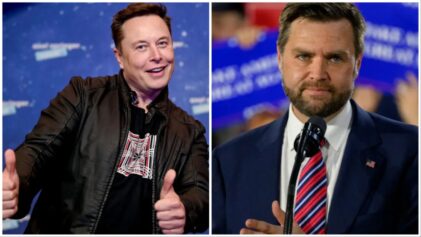Republican door-knockers flown to Michigan to boost voter turnout for former President Donald Trump on behalf of Elon Musk‘s America PAC claim they faced intimidation, strong-arm tactics and poor working conditions amid allegations that 25 percent of door knocks reported by these workers in two swing states likely never occurred.
According to a video obtained by WIRED magazine, several Trump-connected door knockers performed the work while being transported in the back of a U-Haul van and faced threats regarding their lodging at a local motel, which they alleged would not be covered if they failed to meet quotas while out canvassing neighborhoods.
Door-knockers claimed they were unaware they had signed up for anything related to Trump or his billionaire friend Musk, whom Trump has promised a prominent role in his cabinet if he wins a second term.

One canvasser claimed they didn’t realize they were participating in Trump’s campaign until after they reached the job site and signed a nondisclosure agreement.
“I knew nothing of the job, or much of the job description, other than going door to door and asking the voters who are they voting for,” said the individual in the back of the van who asked to remain anonymous. “Then, after I signed over an NDA, is when I found out we are for Republicans and with Trump.”
So far, neither Musk nor America PAC has responded to requests for comment.
The Trump campaign outsourced most of its field operations in Michigan to Musk, a move that has drawn significant criticism from the left. It remains unclear whether any federal labor laws or election laws were violated.
America PAC offers $30 per hour for those looking to “increase voter registration and turnout,” as stated on its website. Additionally, the PAC pays $47 for referrals of registered voters, provided those individuals sign a “petition pledging support for the First and Second Amendments.”
The Federal Election Commission authorized campaigns to outsource canvassing to PACs for the first time earlier this year, opening the door for bigger support from Elon Musk.
Since then, Musk’s PAC has reportedly invested more than $60 million in the 2024 election cycle, primarily backing the former president. Additionally, Musk contributed $75 million to the PAC between July and September.
The door-to-door effort was organized by Blitz Canvassing, a subcontractor, which has received more than $9 million from Musk’s America PAC for presidential campaign canvassing as of Oct. 29.
Blitz Canvassing was flagged for fake door knocks by Campaign Sidekick, the glitchy app used by America PAC and backed by Musk.
According to The Guardian, in Nevada and Arizona, up to a quarter of the door interactions were marked as potential fakes within the app.
The Blitz contract required door knockers to achieve a 17-22% engagement rate during the campaign in order to receive full pay and benefits. But many of the workers found this goal too lofty, given how few people typically answer their doors for strangers, leading to frustrations that resulted in fraudulent entries, according to reports.
These potentially fraudulent numbers raise concerns about the campaign’s decision to delegate most of its canvassing to PACs, according to The Guardian.
During a recent team meeting, out-of-state canvassers for America PAC were warned that if they didn’t meet their quotas — meaning more than 1,000 doors knocked each week — the organization would stop covering their hotel expenses.
“What’s gonna happen is, they’re gonna stop paying for these rooms,” a manager told the workers in the audio recording obtained by WIRED. “And then you’re gonna end up having to pay for it yourself. You can’t do that with no money.”
One worker claimed the group was informed they would have to pay for their own flight home.
At first, the paid door knockers for Blitz Canvassing lacked transportation in Michigan, as none of them had valid driver’s licenses.
On Saturday, Oct. 19, supervisors arranged some Ubers for them to reach their assigned addresses. However, by Sunday, the canvassers were crammed into a rented U-Haul moving van without rear seating or seatbelts, as shown in photos and videos obtained by WIRED. “We were all promised that our transportation would be handled and we’d be in rental cars. Instead, it turned out to be U-Haul vans, and I felt embarrassed and played,” one door knocker told WIRED.
The video captured inside the van reveals a rough ride for the mostly Black door knockers. The contract they signed states: “Recommended attire includes a red polo shirt with khaki pants or jeans, and closed-toed shoes. Clothing with graffiti, writing, or ripped jeans/shorts is not allowed.”
The canvassers were dropped off approximately 40 minutes apart, relying on the Campaign Sidekick mobile app to log their interactions at each front door.
In a contract agreement reviewed by WIRED, door knockers were provided with detailed “performance guidelines” that included a requirement to keep the GPS function of their personal devices activated during work hours. Each door knock was to be completed in 15 seconds or less, and the contractors were instructed to remain on a property for a minimum of 30 seconds.
The Campaign Sidekick app utilized by America PAC also had notable limitations, particularly its lack of geo-tracking capabilities. Consequently, canvassers must keep GPS services on their personal devices, as outlined in a contract reviewed by WIRED. This issue forces them to use “offline walkbooks” within the app, which do not provide GPS functionality or allow for real-time uploads.
In another controversy facing Musk, a judge held a hearing Thursday to review an attempt by the Philadelphia district attorney to halt the billionaire’s million-dollar-per-day sweepstakes across swing states to rally support for Trump.
Musk’s attorneys filed a motion late Wednesday to transfer the case to federal court, arguing it centers on a federal election matter. Despite this, state Judge Angelo Foglietta proceeded with the scheduled hearing at Philadelphia City Hall.


